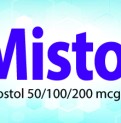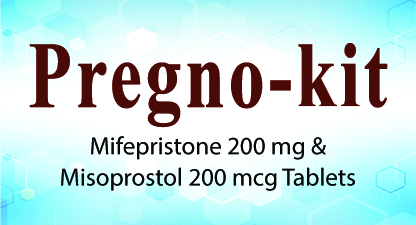MISTOL
It is a synthetic analog of natural prostaglandin E1. It produces a dose-related inhibition of gastric acid and pepsin secretion, and enhances mucosal resistance to injury. It is an effective anti-ulcer agent and also has oxytocic properties.
- Categories : Abortifacient
- Share Now :
MISTOL
Generic Name: Misoprostol
Therapeutic Category: Endocrine-Metabolic Agent
Pharmacologic Class: Prostaglandin
Composition: Each uncoated tablet contains Misoprostol 200 mcg
Pregnancy Category: X
Presentation: Available in the pack size as 4 tablets X 1 blister
Mechanism of Action
At the end of a pregnancy: There are many receptors and a small dose of misoprostol leads to strong contractions. Special attention is required in women with a live fetus [who may hyperstimulate (uterine)*]. Not for use by women with previous caesarean sections - it may cause a ruptured uterus. Uterine ruptures have also been reported occasionally in unscarred uterus.
In early pregnancy: There are few receptors and large doses of misoprostol may need to be given repeatedly in order to have an effect.
For termination of pregnancy: The sensitivity of the uterus to prostaglandins can be increased by giving the progesterone blocker mifepristone to the women 24-48 hours before treatment with misoprostol. This is especially useful in early pregnancy, although it also works in late pregnancy.
Indications
- Softens and opens (dilates) the cervix.
- Causes uterine contraction
- Starts (induces) labor.
- To prevent postpartum hemorrhage.
- In combination with mifepristone it cause abortion
Dosage
Route of administration: Vaginally, orally, sub-lingual
400 μg or 800 μg
Smaller dose while given vaginally.
Pharmacokinetics
Absorption: Rapid absorption
Protein binding: Approximately 85%
Metabolism: Hepatic
Route of elimination: Urine
Half-life: 20-40 minutes
Adverse Effects
Most common side effect is Diarrhea followed by abdominal pain, nausea, flatulence, headache, dyspepsia, vomiting, and constipation.
Contraindications
MISTOL is contraindicated in the following populations and situations:
- Should not be taken by pregnant women for gastric ulcers
- Women with previous cesarean section
Advantages
- Less force needed for dilatation,
- makes the intervention safer and easier
- shortens the time for the procedure
- reduces blood loss in the case of a subsequent surgical abortion
*Terminologies
Uterine hyperstimulation: This may result in fetal heart rate abnormalities, uterine rupture, or placental abruption.




